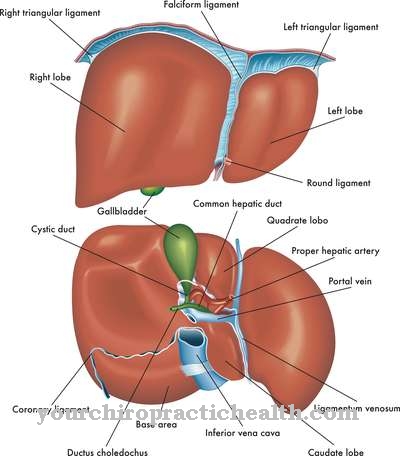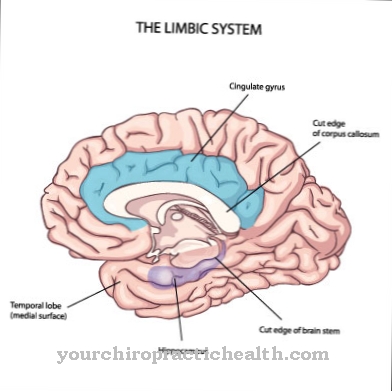At the Alport syndrome it is a hereditary disease. The kidneys, eyes and inner ear are primarily affected.
What is Alport Syndrome?

Doctors also refer to Alport's syndrome as progressive hereditary nephritis. This refers to a hereditary disease in which there is a progressive nephropathy that leads to kidney failure.
Alport syndrome was named after the South African doctor Arthur Cecil Alport (1880-1959), who first described the disease in 1927. In 1961 the hereditary disease was given the name "Alport Syndrome". The rare disease is primarily seen in boys and men.
causes
Despite its rare occurrence, Alport syndrome is the second most common genetic kidney disease in children and young adults. Genetic mutations in type IV collagens are the cause of the hereditary disease. Collagens are an extremely important part of the collagenous connective tissue. This in turn ensures the stability of the organ and cell structure walls. The connective tissue can be found almost all over the body.
It occurs on the skin, blood vessels, nerves, glands, mucous membranes, tendons and muscles. Type IV collagen is also found on the basement membrane of the kidney corpuscles, the eyes and the inner ear. For this reason, these body structures are also affected by Alport's syndrome. Progressive hereditary nephritis is caused by inheritance of genetic defects that already exist within the family.
However, around 15 percent of all diseases also result from new mutations. Since the genetic defect is transferred to the sex-related X chromosomes in Alport syndrome, more than 80 percent of all sufferers are male. In contrast to girls, boys only have one X chromosome.
For this reason, no compensation for the genetic defect is possible in boys. In girls, due to compensation, depending on the inheritance, Alport's syndrome does not necessarily break out. However, the disease can be passed on to later children.
Symptoms, ailments & signs
Alport's syndrome is initially noticeable in the kidneys through the appearance of blood in the urine (hematuria). In the further course, protein also appears in the urine (proteinuria). In the case of infections, the urine is pink, dark red, black or brown, which, despite the terrifying appearance, does not mean any danger. Once the infection subsides, the urine color usually returns to normal.
The ears are also affected by the hereditary disease in the form of inner ear hearing loss that occurs on both sides. It shows up in around 50 percent of all sick people aged between 9 and 12 years. Around ten percent of patients also suffer from changes in their eyes. These are changes in the fundus of the eye, cataracts and a cone-shaped bulging lens.
In rare cases, leiomyomatosis and a malformed esophagus are also found. Malformations of the intestine and trachea are also possible. This can result in symptoms such as inflammation of the esophagus, difficulty swallowing, chronic constipation or swallowing food in babies or toddlers. Finally, chronic progressive renal failure occurs. For this reason, kidney replacement therapy is often required from the second decade of life.
Diagnosis & course
Alport syndrome can now be diagnosed relatively early with the help of various methods. These include a kidney sonography (ultrasound examination), a kidney biopsy, in which a tissue sample is taken from the kidneys, a blood test to determine the blood values, as well as an examination of the urine, which is used to determine the amount of protein.
Furthermore, genetic analyzes can be carried out in a laboratory. Another diagnostic method is to test the child's eyesight and hearing. A detailed medical history of the family also plays an important role. The diagnosis of Alport's syndrome usually only begins when the typical symptoms or functional disorders of the kidneys are present. The course of Alport's syndrome can be very different. In young adulthood, however, kidney failure must often be expected, which necessitates dialysis (blood washing).
Complications
Various complications can arise with Alport syndrome. These depend primarily on whether Alport syndrome was inherited or whether it was caused by an infection. As a rule, the color of the urine changes in Alport syndrome. The urine is red in color and contains blood.
This color looks relatively frightening to the patient, but has no health effects on the body. When Alport's syndrome goes away, the color of the urine will return to normal. In most cases, Alport syndrome leads to hearing loss. Children in particular are affected by this complication.
It leads to a reduced quality of life, which can lead to severe psychological problems and depression in children at a young age. In many cases, this hearing loss can lead to bullying. It is not uncommon for Alport's syndrome to also affect the eyes, which can lead to a cataract or impaired vision.
In some cases, the syndrome also has a negative effect on the throat and bowel, which can lead to swallowing difficulties or malformations in the bowel. In young children with Alport syndrome, swallowing may occur more frequently. Treatment can be given early and severely limit symptoms.
When should you go to the doctor?
In the case of Alport syndrome, a doctor must be consulted in any case. As a rule, the patient's quality of life is extremely reduced due to the syndrome, so that normal everyday life is no longer possible. The hearing loss in particular must be examined and treated by a doctor. The person concerned may be dependent on a hearing aid. The cataract can also be removed by an ophthalmologist so that the person concerned no longer suffers from visual disturbances.
Treatment is also necessary if Alport syndrome causes kidney failure. This can lead to death of the patient without treatment. As a rule, however, the person affected is dependent on dialysis or a donor kidney. A medical examination for Alport syndrome is also necessary for babies and small children so that swallowing difficulties and thus swallowing are avoided.
The syndrome is primarily noticeable through dark urine, and a doctor should also be consulted. The syndrome is usually recognized immediately after the child is born. The respective complaints can, however, be treated correctly by a specialist.
Doctors & therapists in your area
Treatment & Therapy
An effective treatment of Alport's syndrome is not yet possible. Although intensive research is currently being carried out, there is no prospect of a cure for the insidious hereditary disease in the years to come. For this reason, therapy remains limited to treating the symptoms. To halt kidney failure for as long as possible, medical care should begin in early childhood.
An important part of the treatment is the administration of ACE inhibitors such as Xanef or Ramipril. Alternatively, AT antagonists can also be administered. According to studies, the administration of these drugs delays renal failure by about 10 to 15 years. Since kidney failure leads to an increase in blood pressure and thus to further damage to health, it is important to start appropriate therapy at an early stage.
Despite all treatment measures, terminal kidney weakness cannot be completely stopped. If the kidney failure progresses, hemodialysis is essential. A kidney transplant can also be carried out later. The sick child can be given hearing aids to treat the inner ear hearing loss. If their eyesight is impaired, they are given glasses or contact lenses.
In the case of a cataract, an operative correction can be carried out. It is important to have the symptomatic treatment carried out by doctors from several specialist areas. These include an internist, an ear, nose and throat doctor and an ophthalmologist. A genetic counseling of the affected persons is also considered useful.
Outlook & forecast
Alport syndrome primarily causes discomfort to the ears, eyes and kidneys. The everyday life of the person affected is made significantly more difficult by this disease. This leads to a hearing loss, in which the affected person can suffer a complete hearing loss in the worst case. There are also some visual problems. The patients can develop cataracts, which can lead to significant restrictions.
Furthermore, the Alport syndrome also leads to renal insufficiency. If left untreated, this can lead to patient death. The affected person then has to rely on dialysis or a transplant to continue to survive. As a rule, Alport syndrome also significantly reduces the life expectancy of those affected.
The treatment of Alport's syndrome is primarily based on the symptoms and symptoms. It cannot be universally predicted whether this will lead to a positive course of the disease. Often the parents of those affected also suffer from severe psychological complaints and therefore need psychological support.
prevention
Alport syndrome is one of the hereditary diseases. For this reason, no effective prevention is possible.
Aftercare
With Alport syndrome, the options for follow-up care are usually very limited. It is a hereditary disease that cannot be treated causally but only symptomatically. A complete cure cannot therefore be achieved.
If the patient with Alport syndrome wishes to have children, genetic counseling can also be carried out in order to prevent the syndrome from being passed on to future generations. With Alport's syndrome, the person affected is dependent on taking medication.These should be taken regularly to delay kidney failure.
However, the affected person usually dies from this insufficiency if a transplant does not occur. The life expectancy of the person affected is therefore extremely reduced and restricted by the syndrome. Regular eye examinations are also necessary to avoid blindness. It is not uncommon for Alport syndrome to lead to psychological complaints or to severe depression and other upsets.
If these symptoms also occur, talking to your own family, friends or other people with the syndrome is very helpful. This can also lead to an exchange of information, so that the everyday life of the person concerned is also made easier.
You can do that yourself
If Alport syndrome is suspected, the doctor must first be consulted. The disease must be clarified and treated medically. In addition, the patient can take a few measures to support the healing process.
Above all, protection has proven itself. The body is usually very weakened in the first stages of the disease, which is why greater exertion should be avoided. If the disease has caused hearing loss, an audiologist must be consulted.
Further therapeutic measures may be indicated in order to reduce the restrictions for the sick person to a minimum. Natural remedies such as herbal teas, lozenges, essential oils or inhaling table salt help with swallowing problems. Any intestinal problems can often be reduced by changing your diet.
Since Alport's syndrome is a serious disease that often takes a negative course, accompanying therapy is useful. The person concerned should speak to the responsible doctor or go directly to a specialist clinic for hereditary diseases. In order to avoid serious complications, the course of the disease must be monitored by a doctor. The self-help measures and means mentioned are best used in consultation with the doctor.



























